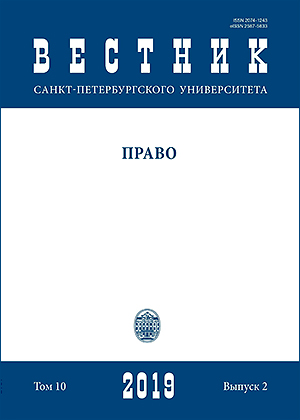National law and order of Russia in the conditions of digitalization
DOI:
https://doi.org/10.21638/spbu14.2019.201Abstract
The article analyzes the impact of digitalization on Russia’s national legal order. Among the main directions of such influence are the expansion of the boundaries of legal regulation at the expense of virtual space, the demand for more flexibility than in existing legal forms and regulatory mechanisms, and the increasing role of the information function of law. The article emphasizes the constructed nature of the rule of law, which refers to the constant activity of subjects of law on the implementation of legal norms. These actions must be carried out continuously, and they are volatile, which is why the rule of law is a constantly changing entity, as its parameters are constantly changing. In this regard, it is important to study the impact of digitalization on the mentality and legal consciousness of the subject of law. Digital reality changes the mentality of the subject of law, its sense of justice, and, consequently, the nature of activities for implementing legal norms. Mass behavior of legal subjects on the implementation of legal norms in the conditions of digital reality is significantly different from the behavior of subjects of law in other conditions. Due to the impact of digitalization, the legal order is partially transferred to virtual space, which complicates the state’s control over legal communications. In these circumstances, conventional legal regulators may not be sufficient to maintain it. Under the influence of digitalization in Russia’s national legal order, the typical domination of public law over private law will be lost, and the ratio and role of procedural and substantive law will change. The conclusion addresses on possible occurrences of such a phenomenon as individual law and order.
Keywords:
law and order, digitalization, digital technologies, legal regulation, subject of law, digital law
Downloads
References
Downloads
Published
How to Cite
Issue
Section
License
Articles of "Vestnik of Saint Petersburg University. Law" are open access distributed under the terms of the License Agreement with Saint Petersburg State University, which permits to the authors unrestricted distribution and self-archiving free of charge.






